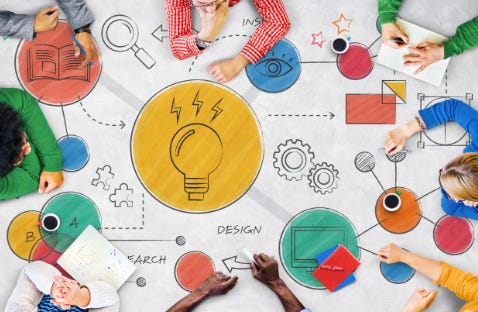- Yaro on AI and Tech Trends
- Posts
- 🔒How Safe Is Apple's Latest AI Implementation?
🔒How Safe Is Apple's Latest AI Implementation?
Plus: The 11 key Apple Intelligence Announcements and If we can 3D Print Rockets, we can 3D Print Anything.
Get in Front of 50k Tech Leaders: Grow With Us
Middle of the Week already Team, Hope all is well on your end. Today we delve into how we can enhance creativity, speed, and collaboration using LLMs. We share how safe is Apple’s latest AI integrations and their key announcements and we are 3D printing rockets now, can we 3D print anything? Lets see…
📰 News and Trends.
Enhancing Creativity, Speed, and Collaboration in Teams.
How Safe Is Apple's Latest AI Implementation?
The 11 key Apple Intelligence Announcements
🧰 AI Tools of The Day (Life Assistants II)
If we can 3D Print Rockets, we can 3D Print Anything.
📰 AI News and Trends
Silicon Valley in uproar over Californian AI safety bill (FT)
US AI Companies are relocating Chinese engineers (Semafor)
Mistral, a Paris-based AI startup, turns 1 year old today. It announced a monster series B funding raise (ThreadReader)
LinkedIn tests AI assistant for Premium members (Axios)
Elon Musk drops suit against OpenAI and Sam Altman (CNBC)
🌐 Other Tech news
Europe’s lawmakers could double-down on boosting Europe’s competitiveness against China, and new tariffs on Chinese imports, especially EVs (BBC)
Ozempic and Wegovy linked to lower risk of alcoholism (NS)
In Wyoming, Bill Gates moves ahead with nuclear project aimed at revolutionizing power generation (AP)
Starbucks is the latest brand to launch its own movie studio joining a growing list of companies branching into production, from LVMH to Mailchimp (FC)
TikTok’s Sister App CapCut Is Used By Millions In The U.S. It May Soon Be Banned (Forbes)
Are portable lithium batteries the solution to strengthen the grid (MIT)
Enhancing Creativity, Speed, and Collaboration in Teams.

To enhance creativity, speed, and collaboration in teams overwhelmed by cognitive overload and knowledge fragmentation, integrating Large Language Models (LLMs) with human processes offers a promising solution. Here’s how:
1. Reducing Cognitive Overload: AI tools can assist in delegation, planning, and load balancing, not to perfect these processes, but to save time that would otherwise be spent manually handling these tasks. This helps free up mental capacity for more strategic thinking.
2. Addressing Knowledge Fragmentation: In large organizations, where turnover and project shifts are common, knowledge often gets lost or is redundantly re-created. LLMs can bridge this gap by pulling together scattered knowledge from various formats like emails, chats, and documents, making it easily accessible and reducing the need to sift through disparate data sources. This streamlined access to information helps minimize distractions and enhances focus.
3. Enhancing Collaboration: By aggregating insights from multiple platforms into a unified view, AI can foster better teamwork and creativity. This is particularly beneficial in settings where collaborative efforts are hampered by fragmented information.
4. Support for Interpretation and Evaluation: While LLMs can surface insights and make inferences, such as identifying social networks or workflows, they also raise questions about privacy and the ethics of data use. Organizations will need to educate their teams on how to interpret AI-derived insights and understand their implications.
5. Implementation and Future Considerations: To fully leverage AI, organizations should promote rigorous documentation and data logging to provide AI systems with rich data sets for analysis. Investing in AI that can interact meaningfully with this data will enhance decision-making and strategic planning.
Leveraging diverse Large Language Models (LLMs) can provide varied perspectives that enhance decision-making. While these models are not a substitute for intuition or human judgment, integrating their outputs can help identify and mitigate blind spots and biases inherent in group thinking. It's crucial to apply human judgment before fully depending on AI insights, but when used wisely, this technology can be a valuable tool in refining strategies and improving overall decision quality.
Invest before this company becomes a household name
What if you had the opportunity to invest in the biggest electronics products before they launched into big box retail, would you?
Ring changed doorbells and Nest changed thermostats. Early investors in these companies earned massive returns, but the opportunity to invest was limited to a select, wealthy few. Not anymore. RYSE has just launched in 100+ Best Buy stores, and you're in luck — you can still invest at only $1.50/share before their name becomes known nationwide.
They have patented the only mass market shade automation device, and their exclusive deal with Best Buy resembles that which led Ring and Nest to their billion-dollar buyouts.
How Safe Is Apple's Latest AI Implementation?

Apple unveiled its AI strategy at the Worldwide Developer Conference, introducing Apple Intelligence—a suite of AI capabilities integrated across its products. Central to this initiative is the Private Cloud Compute system, which processes AI tasks primarily on the device to enhance privacy.
This system only uses the cloud when necessary, ensuring that data is encrypted and not retained after use. This method contrasts with competitors like Google or Meta, highlighting Apple's emphasis on data privacy. The approach uses advanced chip technology, such as the M1 chips, to handle AI tasks on devices, but complicated tasks may still require cloud assistance. Interesting the apple products are threatened to be banned from certain companies but other devices running cloud LLM models are not. This setup has been designed to extend Apple’s device security into cloud operations, with independent verification planned to ensure privacy claims are upheld.
Among this announcement that allegedly makes apple products safer and more private, these were the other key announcements focused on AI integration and system updates:
1. Apple Intelligence: A new AI system integrated across iPhone, iPad, and Mac, enhancing capabilities like image generation and text summarization. It emphasizes security with on-device processing or secure cloud computing.
2. Siri Enhancements: Siri will have deeper integration with new capabilities powered by LLMs for improved understanding and task handling, including a significant upgrade through integration with OpenAI's ChatGPT.
3. AI Features Across Apps: New AI-driven features in Mail, Messages, Photos, Notes, and Phone apps, such as email summarization, custom emoji creation, enhanced photo searches, and AI-powered transcriptions.
4. iOS 18 Updates: Introduction of a customizable Control Center, app icon placement flexibility, app locking, a new Game Mode, and RCS support for messaging.
5. Apple TV Plus Features: New "inSights" feature to identify actors and music during playback and enhanced interaction options.
6. Passwords App: A new app for managing passwords across Apple's ecosystem, similar to existing password managers.
7. iPadOS 18 Enhancements: Introduction of a Calculator app with Apple Pencil support and improvements in handwriting recognition and correction.
8. macOS 15 Features: Ability to mirror iPhone on Mac and a new Highlights feature in Safari for enhanced browsing.
9. watchOS 11: New widgets, Vitals app for health tracking, enhanced cycle tracking, and a Check In feature for workout tracking.
10. visionOS 2: Updates include spatial photos, support for an ultrawide virtual Mac display, and expanded availability of Vision Pro in additional countries.
11. AirPods Pro Updates: New Siri interactions allowing responses through head movements and improved voice isolation for clearer audio.
These announcements showcase Apple's commitment to integrating AI across its product lineup while enhancing user privacy and system functionality.
🧰 AI Tools Of The Day.
Life Assistants II.
Ferret - Due diligence tools for search engines and social media accounts.
Write Me A Cover Letter - Cover Letter writer and assistant.
TinyWow - Offers PDF, video, image and other online tools.
JustLearn - Empower your global communication skills with in-depth knowledge articles tailored for immersive language learning
GPT-Trainer - A must-try AI Agent Platform*
Download over 500+ Tools free here.
If we can 3D Print Rockets, we can 3D Print Anything.
Indian startup Agnikul successfully launched a rocket powered by the world's first 3D printed engine, which was created in just 72 hours. This breakthrough from the Chennai-based company could revolutionize the space industry by enabling quicker, on-demand launches for small satellites. The test flight, conducted on May 30 from the Satish Dhawan Space Center, served as a technology demonstrator and confirmed the effectiveness of Agnikul's innovative manufacturing process. Looking forward, Agnikul plans to scale up to a seven-engine configuration for their two-stage rocket, Agnibaan, aiming for an orbital launch next year.
With this innovation, are we approaching a future where we can 3D print cars, houses, and virtually everything around us? It certainly seems possible, especially considering the durability required for rockets, which must withstand extreme temperatures and speeds. If we can successfully print such complex and resilient structures, the potential applications for everyday objects are vast and exciting.
Newsletter Recommendation:
Growth Forum - Learn how to build a repeatable sales process creating a pipeline full of qualified deals.
Secrets of Success - Learn Mental Models for success.


Reply